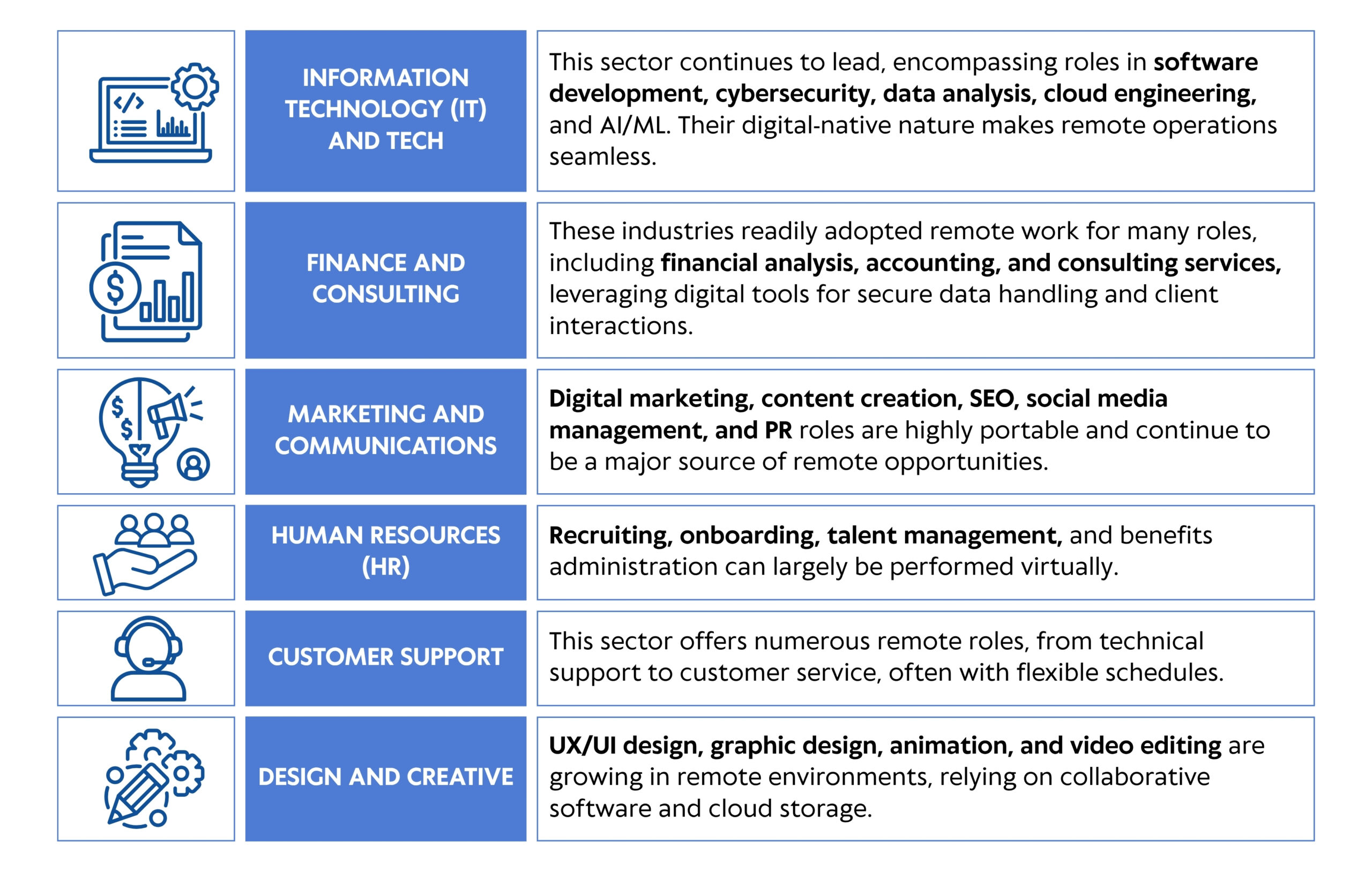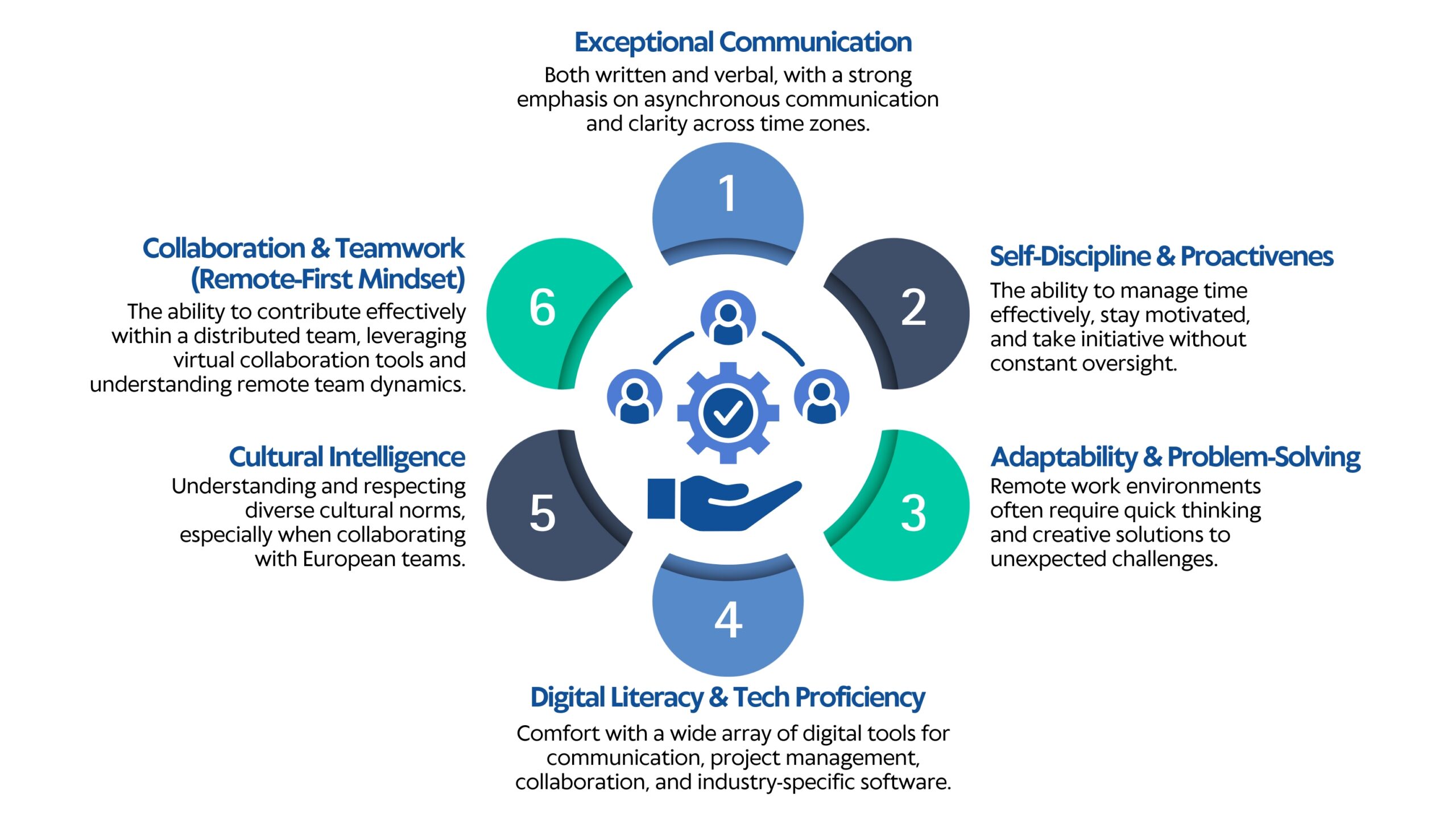Remote Jobs in Europe for Non-EU Citizens: Your 2025 Resources Guide

By 2025, remote work is no longer a trend in Europe, it’s the norm. More and more companies across the continent are hiring beyond their borders, offering flexible work setups that allow employees to stay based in their home countries. With improved digital infrastructure and changing workplace priorities, European employers are more open than ever to building international teams.
What does this mean for professionals outside the EU? Opportunity. The shift to remote work has opened new doors for skilled individuals across the globe, developers in India, marketers in South Africa, designers in Brazil who can now contribute to European companies without needing to relocate.
This article is your guide to tapping into those opportunities. If you’re a non-EU citizen seeking remote work with European employers, we’ll walk you through everything you need to know: which roles are in demand, how to approach applications, and what (if any) visa or compliance considerations you should keep in mind. And guess what, we also have prepared a downloadable guide that will help you with your remote applications!
The evolving panorama of remote work in Europe (2025)
The “work-from-home wave” that swept across Europe during the pandemic hasn’t receded; rather, it has matured and cemented its place as a fundamental aspect of the modern workforce. As we move through 2025, the European remote work landscape is characterized by nuanced shifts and established patterns.
Hybrid dominance with persistent full remote options
The most significant trend in 2025 is the entrenchment of hybrid work models as the new norm across much of Europe. Companies are increasingly adopting structured hybrid protocols, often requiring employees to spend a set number of days (e.g., 2-3 days) in the office per week, or specific anchor days for collaborative tasks and team-building.
However, it’s crucial to emphasize that fully remote roles remain consistently available, particularly within specific sectors and for companies embracing a “remote-first” philosophy where remote work is the default. While the percentage of fully remote new job postings may have leveled off or even slightly declined from its 2022 peak, these roles are not disappearing; they are simply stabilizing within the broader hiring landscape.

Geographic nuances across the continent: The adoption of remote work isn’t uniform across Europe; it’s a patchwork reflecting diverse cultures, economies, and management styles.
– Northern and Western European nations like the UK, Finland, and Germany lead in terms of average remote work days per week (e.g., UK at 1.8 days, Finland at 1.7, Germany at 1.6). These countries, often with strong digital infrastructures and a focus on work-life balance, have seen hybrid work become an expectation rather than just a perk.
– Countries like Portugal remain popular digital nomad hotspots, not just for their lifestyle appeal but also for their relatively high remote work adoption (around 1.5 days/week) and welcoming visa policies.
– In contrast, some Southern and Eastern European countries, such as Greece (0.6 days/week) and France (1 day/week), still show lower remote work rates. This can be attributed to economic structures heavily reliant on in-person sectors (tourism, retail), lower digital readiness in some areas, and more traditional management styles that favor in-office presence.
Sectoral suitability where remote work is going strong: Certain industries are inherently more conducive to remote and hybrid work models, and this remains true in 2025.

While manufacturing, healthcare (patient-facing roles), and hospitality still largely require physical presence, even these sectors are seeing remote options for administrative, IT, and back-office functions. The overall picture in 2025 is one of a flexible, diverse, and mature remote work ecosystem across Europe, ripe with opportunities for those who understand its dynamics.
In-demand remote job roles for non-EU Talent
For non-EU citizens seeking remote work based out of Europe in 2025, the most promising opportunities lie in sectors that are inherently digital, value specialized skills, and are increasingly open to “work-from-anywhere” models or leverage Employer of Record (EOR) services to facilitate global hiring. Here’s a breakdown of the general categories and specific roles currently in high demand:
General Categories & Specific Roles:
1. Tech & IT: The Uncontested Leader in Remote Opportunities
– Software Developers (Front-End, Back-End, Full-Stack).
– Data Analysts & Scientists.
– Cybersecurity Engineers/Analysts.
– UX/UI Designers
– Cloud Solutions Architects/Engineers
– AI/Machine Learning Engineers
– DevOps Engineers
2. Digital Marketing & Creative: Driving Online Presence from Anywhere
– Content Writers & Copywriters
– SEO Specialists
– Social Media Managers
– Performance Marketing Managers
– Graphic Designers & Video Editors
3. Operations & Support: The Backbone of Remote Business
– Project Managers
– Virtual Assistants
– Customer Support Specialists
– HR Roles (e.g., HR Experience Specialist, Talent Acquisition Partner)
– Operations Assistants/Managers
4. Finance: Remote Management of Global Capital
– Financial Analysts
– Accountants (e.g., Global Accounting Manager, Senior Accountant)
– Tax Managers (especially Multinational Tax Managers)
Key Skills: prioritizing competence over location
For non-EU talent, showcasing a strong skill set is vital, often outweighing geographical location in a truly global remote role. Beyond the specific technical proficiencies for each role, the most critical skills for remote work in Europe (and globally) in 2025 include:
Key Skills: prioritizing competence over location
For non-EU talent, showcasing a strong skill set is vital, often outweighing geographical location in a truly global remote role. Beyond the specific technical proficiencies for each role, the most critical skills for remote work in Europe (and globally) in 2025 include:

By focusing on these in-demand roles and cultivating the essential remote work skills, non-EU professionals can significantly enhance their prospects of securing a fulfilling remote career based out of Europe.
Navigating the remote job search from outside Europe
Securing a remote job in Europe when you’re based elsewhere requires a targeted approach. The digital nature of remote work inherently bridges geographical divides, but understanding specific platforms and refining your application strategy are key.
A. Utilizing specialized remote job boards: These platforms are your first port of call, as they curate opportunities specifically designed for remote workers. For example:
We Work Remotely: One of the largest and most established remote job boards, offering a vast array of roles across various industries.
EU Remote Jobs: As its name suggests, this platform specializes in remote opportunities specifically within European companies or roles that require alignment with European time zones.
Working Nomads: Ideal for digital nomads, this site lists remote jobs that support a mobile lifestyle, often with listings for Europe-based or European-time-zone-friendly roles.
Pro-Tip: When using these platforms, always leverage their “worldwide,” “anywhere,” “global,” or “work from anywhere” filters. If those aren’t available, carefully read job descriptions for phrases like “international candidates welcome,” “can be based anywhere,” or indications that the company uses an Employer of Record (EOR) service to hire in various countries.
B. General job platforms: smart searching is key While not exclusively remote, major job aggregators remain powerful tools when used strategically.
LinkedIn: The premier professional networking site is heavily utilized by recruiters across Europe.
Indeed, Glassdoor: These broad job boards also host many remote positions. Similar to LinkedIn, utilize their “remote” filters and look for explicit mentions of global hiring in the job descriptions.
FlexJobs: A subscription-based platform that vets all listings for legitimacy, offering a wide array of flexible and remote jobs, including many with international scope.
C. Freelance platforms: your direct client link For those seeking project-based work or a pathway to build a portfolio for full-time remote roles, freelance platforms are invaluable. Many European businesses outsource work through these channels.
Upwork: One of the largest global freelancing platforms, allowing you to bid on projects from European clients across a myriad of skills (tech, marketing, writing, design, consulting).
Toptal: For top-tier freelance talent, particularly in tech (developers, designers, finance experts, project managers). Toptal connects highly skilled individuals with companies globally, including a strong European client base.
Fiverr: Ideal for creative services and micro-tasks (graphic design, video editing, copywriting gigs), attracting many European small businesses and startups.
Application strategies for Non-EU Remote Talent
Applying for a remote job in Europe from outside the EU requires specific considerations to ensure your application stands out and addresses potential employer concerns.
1. Tailoring your CV and cover letter to European standards:
– Conciseness: Aim for 1-2 pages for a CV. You can download optimized templates in the Coach4expats page for FREE.
– Professional Photo: While less common in some non-EU countries, including a professional headshot on your CV can be standard in many parts of Europe (e.g., Germany). However, for truly global remote roles, it’s often optional.
– Personal Information: Include essential contact details. Marital status or nationality can be omitted unless directly relevant to a visa.
– Focus on Achievements: Quantify your accomplishments with data and results rather than just listing duties.
– Skills Section: Clearly list your technical skills, software proficiencies, and language abilities.
– Cover Letter: Always include a customized cover letter. Address how you will manage time zones and maintain communication.
– Addressing time zone differences for collaboration:
– Be Proactive: In your cover letter or during initial screening, acknowledge the time zone difference.
– Propose Solutions: Suggest how you’ll manage it: “I am flexible and willing to adjust my schedule to ensure significant overlap with CEST/CET business hours,” or “I am accustomed to asynchronous communication tools to ensure seamless collaboration despite time zone differences.”
– Demonstrate Understanding: Show you’ve thought about how to maintain productivity and team cohesion.
2. Be prepared for visa & legal status discussions:
–Honesty is Key: Clearly state your current location.
– Digital Nomad Visa (DNV) Plans: If you intend to move to Europe using a DNV, be prepared to articulate your understanding of the visa requirements and your plan to obtain it.
–Employer of Record (EOR) Awareness: Mention that you understand companies often use EOR services for international hires.
–Right-to-Work: Be ready to explain your legal ability to work from your current location if the role is “worldwide remote,” or your strategy for gaining legal residency if the role requires you to relocate to Europe.
– Networking: building bridges across continents:
3. LinkedIn professional networking: Connect with recruiters, hiring managers, and professionals in your target industries and European countries. Join relevant LinkedIn groups focusing on remote work in Europe or specific tech/industry niches.
4. Online communities: Participate in digital nomad forums, Slack channels, and industry-specific online communities. These can be great sources for job leads, advice, and direct connections. You can join our Coach4expats community for FREE! We also have a premium option with incredible resources.
4. Virtual job fairs & Webinars: Attend online recruitment events hosted by European companies or organizations like EURES (European Employment Services), which specifically aim to connect job seekers with opportunities across Europe.
5. Qualifications recognition & language proficiency:
– Qualification Recognition: While many non-regulated professions (like software development, marketing) don’t require formal validation of your degree, having your qualifications translated and evaluated (e.g., via the ENIC-NARIC network) can add credibility and be useful for some roles or visa applications.
– Language Benefits: While English is often the working language in multinational companies and tech hubs like Berlin, Amsterdam, or Dublin, learning the local language (even basic conversational skills) significantly enhances your integration, personal life, and can give you an edge, especially for roles involving local customer interaction or deeper team integration. Highlight any language proficiencies on your CV.

Seizing your European remote opportunity
In 2025, the doors to Europe’s remote job market are wide open—even for professionals living far beyond its borders. With more companies embracing distributed teams, digital-first operations, and flexible hiring structures like Employer of Record (EOR) services, non-EU talent now has real and growing access to remote careers in tech, marketing, design, operations, and more.
Remote work has removed many of the traditional barriers tied to location and nationality. What matters most today is your skill set, your ability to work independently across time zones, and your understanding of how to position yourself for a European employer. From identifying in-demand roles to tailoring your application and navigating visa or compliance issues, you now have the tools to start your journey.







